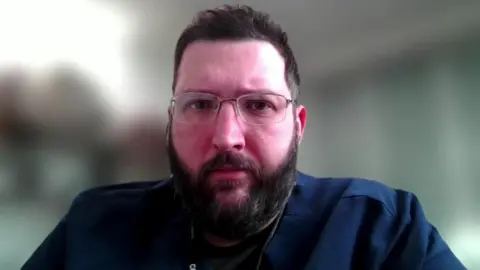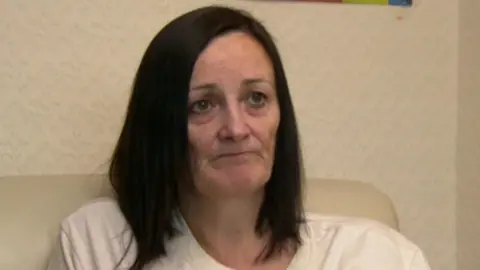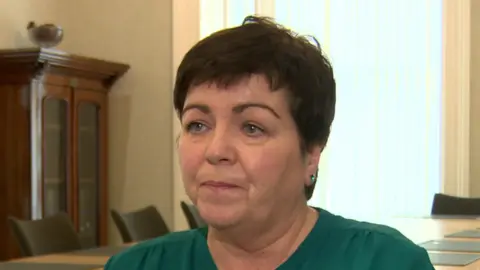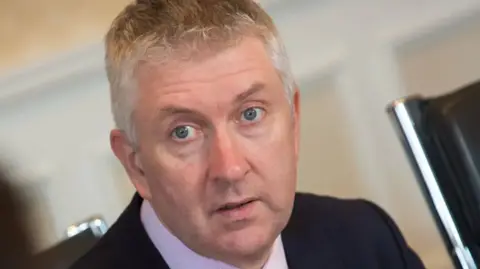Emergency departments have no space, says doctor
 BBC
BBCThe pressure in Northern Ireland's emergency departments (EDs) is "as bad as it's ever been", the vice-chair of the Royal College of Emergency Medicine has said.
Dr Michael Perry said there was no more space for patients, adding that staff were fearful of what the next two weeks would bring.
It comes after figures from New Year's Eve showed more than half of the 892 people who attended EDs had to endure a wait of more than 12 hours.
On Thursday, Dr Clodagh Corrigan, deputy chairwoman of the British Medical Association in Northern Ireland, said the impact of winter pressures had filled staff with fear for the weeks ahead.
"There is no flexibility at the minute in our emergency departments," Dr Perry said.
He told BBC News NI staff were "already sort of seeing the worst-case scenarios" because patients were being admitted, but there was "no flow" back out again.
He said this was because there were so many patients who were ready to be discharged from wards but could not be due to "the issues in social care".
"The situation is as bad as it's ever been but it doesn't feel extraordinary to me because this is the environment we've been asked to operate in for months to years," he said.
 PA Media
PA MediaHealth Minister Mike Nesbitt said EDs were "not in a good position" to deal with continuing winter pressures, adding that he feared for the days and weeks ahead, particularly because of flu.
"Modelling from the past would suggest that's not going to peak for another one to two weeks so we are not in a good position at all," he told BBC News NI's Good Morning Ulster programme.
He added that patients expected "an appropriate level of privacy", which "does not always happen because of the nature of the demand at the moment in EDs".
Almost 400 people were waiting for a hospital bed in Northern Ireland last week, with flu and respiratory infections affecting many people.
'Hospital was like a warzone'
Michelle Gibson, who has been diagnosed with neuropathy, laid on the floor in her home for 12 hours as she waited for an ambulance.
"I was told by the panic alarm people who kept phoning for an ambulance that it would be a 24-hour wait in Northern Ireland to get an ambulance," she told BBC News NI.
"I was panicked obviously lying for 12 hours on the floor before they eventually sent a non-emergency paramedic team."

The paramedic team called for an ambulance to take Ms Gibson to hospital where she said she then spent a further 12 hours waiting on treatment on a trolley.
"I can only describe it as going into a warzone. Whenever I got there, there were bodies everywhere and I mean everywhere, lying in corridors. It was just terrible," she said.
As someone who would regularly attend an ED due to her condition causing her to fall, Michelle said it was "the worst I have ever seen".
After waiting on treatment for 24 hours in total, Ms Gibson decided to check herself out of the hospital due to the environment she was waiting in.
Responding to the health minister's concerns, she said she was "100% fearful for what is to come in the next two weeks".
"You've got people that are dying in hospitals here. You've got a health system on it's knees and you've got people lying in corridors," she added.
'Shocking and shameful'
Rita Devlin of the Royal College of Nursing said it was "one of the most difficult times" for her organisation's members.
Speaking to BBC News NI's Talkback programme, she described healthcare staff as being "at their wit's end".

She said EDs were in a state that was "shocking and shameful" for staff and patients.
Ms Devlin said the health minister had promised things would be different during a visit to Antrim Hospital's ED on Tuesday.
She said she would hold him to account if he did not deliver.
"We are running way over 100% capacity at all times and that is not conducive to any kind of safe care," she said.
Pharmacy impact
Gerard Greene, the head of Community Pharmacy NI, said pharmacies were also extremely busy.
"We're hearing people describe it as relentless," he said.
Mr Greene said people were picking up on public messaging from the Department of Health encouraging them to use the appropriate part of the health service for symptoms - for example, going to pharmacies initially to avoid putting pressure on GPs, EDs, and out-of-hours doctors.
 Brian Thompson
Brian Thompson"It's about looking after patients. We're trying to help and play our part in managing the demand and taking the pressure off GPs, out-of-hours, etc," he said.
"It's about using the resource as best as possible. Community pharmacy, since the pandemic, has stepped forward in terms of what we can do."
He said pharmacies offered a much wider range of services than in the past, with the Pharmacy First service allowing a range of conditions to be treated.
